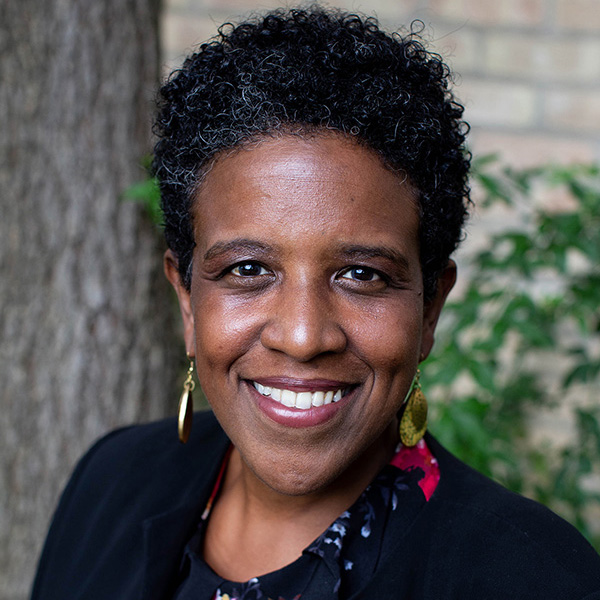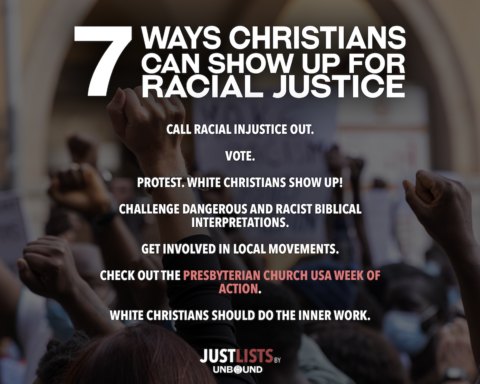Lee Catoe:
I have a question about the performative aspect of scripture and how Matthew’s audience would receive it. If not everyone could read this text and performance was a way in which people received it, how does the front-loaded translation you gave evoke a more active participation—if it does—for both his audience and in our calling? What performance and more creative ways of dealing with scripture may also invite us to be more active? Does the text reflect how it was actually given to the people?
Aymer:
Nice question. I wish I could have done more research on that, but from what we gather, Matthew set the story of this text on the Mount of Olives. Jesus talking to his disciples and it takes place between Jesus’s triumphal entry into Jerusalem and his crucifixion. So he is predicting the judgment of all things, the rectification of all things. He’s sitting looking out at Jerusalem and the Roman fortress behind the temple and knowing what’s coming and knowing what has just happened, knowing the ways in which the religious elites are very much in league with Rome, very much allies of Rome. Despite all that, he is predicting that in the end all of it is going to be judged by God, which is a rather radical thing to say, but he’s not saying it to the crowds. He’s saying it to a gathering of his disciples on the Mount of Olives.
The text then would have been read in gatherings together of Christians probably in somebody’s home, probably after wine and food. It might be acted out and there’s some things about the text that would immediately have struck people. The King entering and coming with angels. Already that’s a performative thing. You’ve got this amazing image and sitting on a throne already says judgment. When the emperor or the council comes out and sits on the bimah, a pronouncement is about to be made. A judgment is about the nations. And the judgment with the separation into left and right already tells them that the people on the left are in trouble because in Jewish mysticism, God’s left was the side of judgment. God’s right was kinder; that was always the case. So all of this would already have signaled something’s about to happen.
The surprise in the text is whenever you did this to the least of these, to me, you did it. And the emphasis on emoy at the beginning of that as a performance would have been dramatic. Then the exact same speech slightly truncated at the very end is given to those who are judged and those who are judged don’t even engage in the poetry. They are just, ‘when did we see you –go down the list of all these things– and we did not minister to you. And the response is the same, whenever you did not do these to the least of these, to me, you did not do it. So it’s set up in a way that you can see the action taking place vividly as it’s told.
Iosso:
Margaret, can you link that third parable in Matthew 25 to the two proceeding texts? We have the wise and foolish maidens and a complicated text that appears to justify inequality. I don’t want to argue with it too much, but are there connections as you read them?
Aymer:
Oh, I argue with that all the time. Now I didn’t do research on this because I didn’t think I had to. But I read the preceding parable first of all as a story of the truth telling slave because there is a problem with an earlier text where the slave does not tell the truth. So the slave goes in and says, ‘you are a harsh man. Do not steal. You don’t get to take what is yours. And so here’s your thing back.’ And the man banishes him for not making money on his unjust gains, which would have been very common in the ancient world.
The question is, when Jesus comes back, what side of the line is the slave standing? Is the slave standing on the line that fed the hungry and gave food to the thirsty and, and clothed the naked? And that is a big question. I would turn you to Dorothee Soelle for reading these. I haven’t really done the research on the beginnings of the foolish and the wise bridesmaids or the one I like to call the selfish bridesmaids because again, that kind of selfishness was really uncommon in the ancient world.
Iosso:
I usually read the wise and foolish bridesmaids as a parable about spiritual preparation or growth in faith which is hard to share with somebody who has not done the inner work themselves. In terms of Jesus’ life approaching its end, I think we see him presented as prepared for that closure. But we have been looking at the finality of judgment in environmental terms today. We did a tour of part of Louisville looking at environmental racism and the people who are often left unprotected from toxins and pollution. In terms of the 3 big themes we (as PMA) are looking at, this has meant that we were looking at structural racism and systemic poverty. We were asking the why questions and looking at human needs.
The third theme that PMA has been using in applying the text is “congregational vitality.” Can you see ways that the text might talk to this?
Aymer:
Well, I think that depends on what you consider a vital congregation. Backing up, I sing in a community women’s choir. We are a hundred people strong. We are a non-audition choir and every time the new year rolls around we have 25 to 30 new women walk in the door, every single time. The choir is more diverse than any church I’ve been a member of. We are not the best choir in Austin. We’re never going to go to Carnegie Hall, you know, that’s not our stuff. But we are a vital and alive choir and have been for 32 years. What makes something vital and alive? We are working together to do something that we care about deeply in light of what is our mission as a choir.
For a church, what makes a church vital? Vitality is not a size question. But it is some view of the totality of active discipleship going on at the church. By active discipleship we mean the church impacting more than one hour on Sunday morning in the lives of the people that are involved in this church? Now, if the church has a mission and a call to the congregation to be involved in the actions of the end of Matthew 25, that’s going to be a vital congregation because people are going to be doing stuff, and they’re going to be thinking theologically about why they’re doing these things. The action and reflection will begin to affect their faith and their faith will grow.
I would argue that if you’re doing that stuff, people are gonna pay attention and start coming to your church, too. So if you’re looking for numbers, start feeding the poor, but then be prepared that the poor are going to be sitting next to you in the pew. Be prepared that those who used to be naked are going to be sitting next to you in the pew and they may still be hungry and they’re going to be sitting next to you in the pew. And then as a church, we need to say, okay, these are our brothers and sisters and we have to make sure that they have what they need.
There are some big African-American evangelical churches right now that are doing a push to pay off debt for the whole congregation. One of the big issues of stress for those congregations that’s causing fears of hunger and of nakedness and of homelessness is credit card and academic debt. So they’re doing a congregation-wide push to pay off debt, starting with those who owe the most.
Again, then, I would ask what you mean by vital congregation? What are the hallmarks of vitality? Because I do see how acting the calls in Matthew 25 would lead to a vital congregation. If you use the interaction of that call, not just that we’re going to do this mission project, but we as a congregation are going to think theologically and critically and act in particular ways. This way we understand that this mission is a part of how we live out our faith and our faith does not fully exist unless we’re doing this.
Alonzo Johnson:
I think that you have one of the most powerful analyses of the Beatitudes as you talk about the difference between understanding as “blessed” or as “highly favored” are the poor. Can you talk a little bit more about the “highly favored” aspect of it? Because we have seen the “blessed are the poor” used to oppress people, to make them think that their suffering is holy, can you talk a bit more about highly favored and how that is more redemptive?
Aymer:
Yes, absolutely. Now you’re swimming in my water. I’m using the work that K.C. Hanson did on the word Makarios. Makarios and makarism is the primary word in all of the Beatitudes. The word has traditionally been translated “blessing” because of the ways in which English was translated. The word really has more of the meaning of “worthy of honor,” or “worthy of esteem” which is a radical thinking, right? Because the people who would’ve been impoverished would not have been esteemed. The mourners would not have been esteemed. The humbled would not have been esteemed. The persecuted would not have been esteemed. Those would’ve been looked down upon. And these are the people that are worthy of esteem says Jesus. And so it’s not simply worthy of money, but also worthy of the capital that you cannot purchase with the American dollar which is honor, which is self respect, which is being worthy to be called sir and ma’am, which is being worthy to be shown the best seat, which is being worthy to be treated as an equal, which is being worthy not to be talked down to, as well as worthy of having a day’s meal.
The reason these folks are of worth, according to Jesus in Matthew 5, is that the kingdom of heaven consists of these folks. The kingdom of heaven consists of those who have been persecuted for the sake of justice, and for all those who are impoverished. The kingdom of heaven is of the sons of God who make peace. It’s a radical idea and it’s a different sense of blessing. We’re not saying that God blesses them and this is going back to what I said earlier. The typical word that is used in the biblical texts for a divine blessing or when God blesses is either eulogos or eulogeo as the verb. That’s where we get the word ‘eulogy’ from. It’s a good word. It is a divine blessing. We see that word in Matthew 25; “come you who have been blessed by my father.” Literally, God has given you a blessing.
That is not the word in Matthew 5. The word in Matthew 5 is to the disciples and it is saying, these are the folks you need to honor. It’s not saying that these are the folks that God has divinely blessed on the first half. They are worthy of honor because of what God is going to do for them, not the other way around. Does that make sense? (yes, thank you).
Denise Anderson:
I just wanted to make a comment or an expression of gratitude for everything that I’m hearing. Because what keeps jumping out to me is a sense of unity or perhaps unification. Our tendency in the church is often to see people in need as objects of mission. What I hear you teaching us, or what I hear the Spirit saying through you, is Christ’s understanding of his unity with all of us who are experiencing any kind of poverty or marginalization. Then that is where the church needs to stand. But what does that identification or unity mean for our work? If God is not outside or alongside but more inside, are we our own mission field? What is the implication of this unity for our orientation to our work?
I also want to thank you and the brilliance that God has given you for helping us through this.
Aymer:
Well, thank you Madam moderator! The word that comes to my mind is ujamaa and it is the sense that we are because of each other. I am because you are, you are because I am, so it is not the sense of I’m here to serve you so that I can get my place on the right side of thought. But rather I am here because this is where Christ is and you are part of Christ. And together we will work together for the kingdom. I’m going to work alongside you to make sure that you are not in harm, and when I am in harm, you will stand with me. You know, we always think about ourselves as the ones who are going to be the givers. We never think one of these days we’ll be the recipient.
My father has a PhD in new Testament. He was the president of a seminary for 20 years and before that he was the academic dean of Drew University School of Theology for 12 years. My father now has dementia. My father lives in memory care. People have to take care of him. He will never be self sufficient again a day in his life, and in the next year or two, I expect that he will have to be fed every day. He has to be clothed, he has to be visited. He did not see himself in that. He was never that person. But we assume that we will never be those people. That’s the conceit of those of us who see it as, oh, this is us doing mission to those people over there. (No).We’re doing what the church is supposed to do and we are praying that the church will continue to do what the church is supposed to do when we need the church.
For more information on the Matthew 25 Initiative of the Presbyterian Mission Agency, click here.

Margaret Aymer joined the faculty of Austin Seminary in 2015. She teaches core courses on the Introduction to the New Testament, Exegesis, and Greek and elective courses in numerous disciplines including African Americans and the Bible, and feminist and womanist biblical interpretation. Active in the Society of Biblical Literature and American Academy of Religion, she has spoken as a guest lecturer at numerous academic and church conferences across the United States, including the 2013 MidWinter Lectures at Austin Seminary. There she was the Robert Jones Lecturer, offering a discourse on the “New Testament as Migrant Writings.” Aymer wrote Confessing the Beatitudes, the 2011 Horizons Bible Study (the annual Bible study resource for Presbyterian women), for which she won the Award of Excellence by the Associated Church Press.
Aymer has published four books: James: Diaspora Rhetorics of a Friend of God (Sheffield Publishing, 2014), Fortress Commentary on the Bible (with Gale A. Yee, Fortress Press, 2014); First Pure, then Peaceable: Frederick Douglass Reads James (T&T Clark, 2008), and Islanders, Islands and the Bible: Ruminations (Semeia Studies, 2015; with Jione Havea).
Prior to coming to Austin Seminary, Dr. Aymer taught at Interdenominational Theological Center in Atlanta, Georgia, since 2004. Aymer has served the Presbyterian Church (U.S.A.) broadly. She has served on the Presbyteries’ Cooperative Committee on Examinations since 2010, moderating the six persons who write the Bible Exegesis Ordination Examination for the Presbyterian Church (U.S.A.). She was a member of the Committee on Preparation of Ministry of the Presbyterian Church (U.S.A.) from 2010-2011, training sessions (governing bodies) of local congregations on the ordination process and their responsibilities therein. Aymer was also a member of the General Assembly Task Force on Civil Unions and Marriage (2009-2010), and she served as a steering committee member for the Committee on Theological Education Consultation on Racism from 2004-2008.






Unbound Social